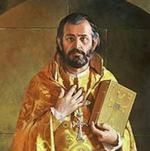Dublin's Archbishop Martin: the eye of the storm
By Phil Lawler ( bio - articles - email ) | Feb 19, 2010
Speaking after the Irish bishops had finished their 2-day meeting with Pope Benedict XVI and the leaders of the Roman Curia, Cardinal Sean Brady of Armagh assured reporters that “there is no disunity among the Irish bishops concerning the importance of the safeguarding of children.”
That’s true: the Irish bishops are fully agreed-- on the importance of safeguarding children. But there definitely is some disunity within the Irish hierarchy on related topics. And the focus of that disunity is the Archbishop of Dublin, Diarmuid Martin.
When the Murphy Commission report exposed a pattern of covering up sexual abuse in the Dublin archdiocese, Archbishop Martin did something that no American prelate has ever done: he openly criticized his colleagues for their handling of the abuse problem. He even suggested that some bishops, having been implicated in the cover-up that the Murphy Commission found, should now reconsider their status. In effect, Archbishop Martin was unmistakably suggesting that some other Irish bishops should resign.
That suggestion was popular with the spokesmen for Irish abuse victims. But other Irish bishops were, not surprisingly, not nearly so happy about Archbishop Martin’s outspoken approach. Some critics muttered that the Archbishop of Dublin was pandering, currying favor with the secular media. Others noted that he had no right to call for the resignation of a brother bishop; only the Roman Pontiff has that authority.
Archbishop Martin was in a unique position from the beginning of his tenure in Dublin. He arrived at a time when the sex-abuse scandal was just beginning to percolate. Having been stationed in Rome for years--he had most recently been secretary of the Pontifical Council for Justice and Peace--he had never previously been involved in Irish diocesan administration, so he was immune from criticism about any cover-up that occurred before his arrival. Since the Murphy Commission inquiry covered only the years up to Archbishop Martin’s installation, the new head of the Dublin archdiocese had no personal reason to fear the results of the investigation. He cooperated fully with the Murphy Commission--over the objections of his predecessor, Cardinal Desmond Connell.
So the pattern was set long ago: Archbishop Martin would call for transparency; he would champion the cause of abuse victims; he would criticize the past policies of the Irish hierarchy; he would not shrink from conflicts with other bishops.
Going into this week’s meetings in Rome, the Dublin archbishop was the focus of public attention: the most visible, most loquacious member of the Irish hierarchy. He assured victims’ groups that he would relay to the Pope their demand for the resignation of more Irish bishops, and that he would encourage the Pope to schedule a meeting with the victims. He boldly predicted that the meetings would lead to “a very significant reorganization of the Church in Ireland.”
Then the sessions began, and Archbishop Martin faded into the background. No more Irish bishops offered to resign. The Pope did not set up a meeting with abuse victims (although that remains a possibility for the future). The closing statement issued by the bishops after their meetings made no mention of a “significant reorganization” for the Church.
When the Irish bishops spoke with reporters in Rome after the sessions it was Cardinal Brady who fielded the questions. Archbishop Martin had already left Rome, and his quick departure fueled suspicions that he was unhappy with the outcome of the meetings.
Actually the archbishop had planned his early departure even before the meetings began; he was scheduled to be back in Dublin for Ash Wednesday services. But by the time he arrived he was facing severe disappointment among the people who had been his strongest supporters: the secular media and the abuse victims. Archbishop Martin struggled manfully to convey the idea that the sessions in Rome had been fruitful.
For good reasons and bad--because he has been willing to criticize other bishops, and ready to ally himself with people who are using the sex-abuse scandal as an opportunity to call for radical change in Catholic teaching and discipline--Archbishop Martin is now in a very uncomfortable position, assailed from all sides.
All comments are moderated. To lighten our editing burden, only current donors are allowed to Sound Off. If you are a current donor, log in to see the comment form; otherwise please support our work, and Sound Off!
-
Posted by: -
Feb. 24, 2010 9:49 AM ET USA
We have to agree with the "circle the wagons" comment. This is the collegial facet of clericalism (the other facet being condescending clericalism -- vis-a-vis mere laity). Unfortunately, clericalism is with us still. Bernard Law ought to be in a monastery in New Zealand.
-
Posted by: bsp1022 -
Feb. 23, 2010 8:30 PM ET USA
I socialize a lot with priests [mostly Irish], both friends and relatives and one conclusion is inescapable. No "band of brothers" can circle the wagons like the Catholic Church. After 62 years, I did not think anything the Catholic Church did would shock me until JPII [a personal hero] appointed Cardinal Bernard Law to St. Mary Major in Rome [stipend reported @ 5-10k/mo]. It was for good cause that Christ assured his followers that His church would endure to the end.
-
Posted by: -
Feb. 21, 2010 11:25 AM ET USA
Diarmuid Martin is such a champion for the rights of victims that he has let Cardinal Connell off into the sunset?Imagine,the 1 prelate who knows exactly what was going on during the 80's/90's and Martin doesn't formally request that Connell make a statement.Martin is Archbishop of over 1 million Catholics-he is not there solely for the benefit of abuse victims (crucial though their voices are).At the moment,for the wider Catholic population,I don't believe he has the marks of a good shepherd.





